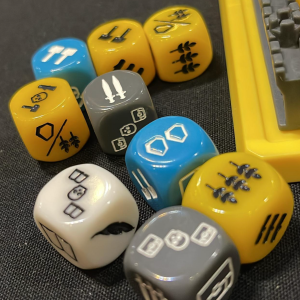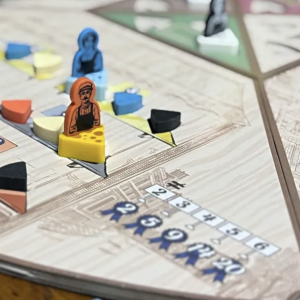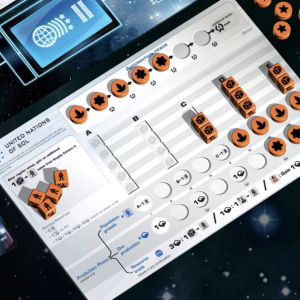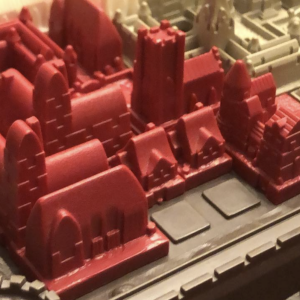Episodes

Thursday May 22, 2025
Timmy, Johnny and Spike and the usage of personas in game design
Thursday May 22, 2025
Thursday May 22, 2025
In this episode, we delve into the significance of personas in UX design and their parallel in board game design. Personas are essential tools for designers, helping them to focus on the user's perspective and ensuring that the product meets the user's needs rather than just the designer's understanding. By segmenting users into groups with specific traits, designers can foster empathy and advocate for user-centered solutions. The discussion extends to board game design, where understanding the target audience is crucial. Inspired by an article by Magic: The Gathering's Mark Rosewater, we explore how personas, referred to as Psychographic Profiles in the gaming world, help designers create games that resonate with players. The episode also introduces the concept of aesthetic profiles, highlighting the importance of aligning game aesthetics with audience expectations even during the prototyping phase. This consideration can significantly impact whether players enjoy the game, emphasizing the role of aesthetics in design.

Tuesday May 20, 2025
The rule book is clear and easy to understand
Tuesday May 20, 2025
Tuesday May 20, 2025
In this episode, we dive into the crucial role that rulebooks play in shaping a player's experience. A well-crafted rulebook is the first step toward an enjoyable game, setting the stage for understanding and engagement. However, what happens when the rulebook falls short?Join us as we dissect the flawed rulebook of the Kickstarter game "Castles," which left players confused and frustrated. We explore common pitfalls such as undefined terms, inconsistent structure, and lack of helpful examples that can derail even the most promising games.To highlight the difference, we contrast this with the exemplary rulebook of "Star Wars: Rebellion," demonstrating how clarity, logical progression, and detailed examples can enhance gameplay. Discover the importance of a well-thought-out rulebook and how it can make or break a game's success.

Monday May 12, 2025
Proposition density
Monday May 12, 2025
Monday May 12, 2025
In this enlightening episode, we delve into the concept of proposition density in graphic design and its impact on both aesthetics and functionality. Discover how balancing visual elements with the information they convey can lead to cleaner, more effective designs. Using the iconic Obama 2008 campaign logo as an example, we explore how a high proposition density contributes to a strong, simple visual impact.We then extend this principle to the realm of board games, examining how games like "Age of Innovation," "Pandemic," "Traders of Osaka," "Innovation," and "Terraforming Mars" utilize proposition density to enhance gameplay. By analyzing the balance between surface and deep propositions, we uncover how these games achieve elegance and clarity, even within complex systems.Join us as we explore how proposition density can transform both design and gaming, offering insights into creating more meaningful and streamlined experiences. Learn how to assess and refine your own designs and games by focusing on the depth and purpose of each component.

Monday May 12, 2025
Labels, elements, and actions are consistent throughout the game
Monday May 12, 2025
Monday May 12, 2025
In this episode, we delve into the crucial role of consistency in both UX design and board game creation, exploring how it enhances understandability and enriches player experience. We examine how games like "Tapestry" leverage consistent iconography and design elements to simplify gameplay and create a seamless experience for players.We also look at the smaller scale game "Hero Realms," which showcases the importance of defining and adhering to a consistent system, even in a compact game. The episode highlights the significance of iconography choices and the effortless interaction they facilitate.The discussion then shifts to "Dune: War for Arrakis," focusing on the careful use of terminology and consistent symbolism to build player trust and understanding. The episode illustrates how these thoughtful design choices can make complex games more approachable.Finally, we explore "Eclipse: Second Dawn for the Galaxy," emphasizing the elegance of simplifying actions through consistent presentation and execution. By distilling gameplay into six core actions, the game enhances player enjoyment and accessibility.This episode underscores the value of consistency in game design and its impact on user experience, demonstrating how meticulous attention to detail can transform gameplay into a satisfying and intuitive experience.

Friday Apr 18, 2025
Icons’ meanings are easy to figure out, both individually and in combination
Friday Apr 18, 2025
Friday Apr 18, 2025
In this episode, we delve into the crucial role of icons in enhancing player experience and streamlining gameplay in board games. Icons, akin to their use in UX design, help players quickly identify and comprehend game mechanics, allowing them to focus on the fun aspects of the game. We explore how icons not only simplify complex rules but also serve as a universal language within games, creating a seamless and engaging player experience. We discuss the nuanced differences between icons and symbols, examining how each can represent game actions and concepts effectively. Through examples from popular board games like "Endeavor: Age of Sail," "Era: Medieval Age," and "Smartphone Inc.," we illustrate how icons can act as pointers, language anchors, and even as part of a sentence structure to convey gameplay mechanics. Additionally, we explore the creative and supportive roles icons play in games such as "Canvas" and "Cosmic Frog," emphasizing their importance in maintaining consistency and clarity across the gaming experience. Join us as we unravel the fascinating world of icons and their impact on board game design.

Monday Apr 07, 2025
Elements are repeated in the appropriate context to aid the player.
Monday Apr 07, 2025
Monday Apr 07, 2025
Explore the fascinating world of Information Architecture (IA) and its role in organizing content for easy access and understanding. This episode delves into the principle of repeating information across all relevant contexts to enhance user experience, drawing parallels between digital spaces and real-world examples like grocery stores.
Discover how board games utilize this principle to streamline gameplay and improve player experience. Learn how games like Ark Nova, Root, and Fliptown incorporate repeated information into player boards, making rules and gameplay mechanics easily accessible and reducing the need for constant rulebook referencing.
We also discuss the role of player aids, the balance between graphic design and user-friendliness, and the importance of playtesting to identify areas where repetition can enhance the gaming experience. Tune in to understand how thoughtful repetition can transform both digital products and tabletop games into more intuitive and enjoyable experiences.

Thursday Mar 27, 2025

Thursday Mar 20, 2025
Game pieces are easy to handle and tell apart
Thursday Mar 20, 2025
Thursday Mar 20, 2025
In this insightful episode, we delve into the importance of accessibility in game design, focusing on how physical components can significantly enhance the player experience. We explore how designing game pieces to be easy to handle and distinguishable can make games more inclusive and enjoyable for everyone, drawing parallels with the transformative design of the OXO vegetable peeler.We highlight various examples from popular board games like "Foundations of Rome," "Tapestry," and "Blood Rage" to illustrate how big, chunky pieces and multiple indicators can improve accessibility. These design choices not only benefit players with disabilities but also enhance the overall experience for all players.Additionally, we discuss the value of physical supports, such as double-layered tiles and racks in games like "Project L" and "Rummikub," which make handling pieces easier. We also address common pitfalls with poorly designed tokens, using examples from "Star Frontiers" and "War of the Ring," and offer strategies to improve accessibility in game design.




